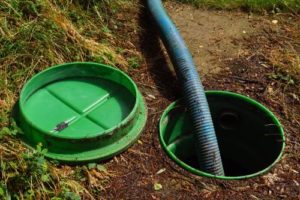
A burst septic tank is more than just a stinky annoyance. They can cause damage to your home and endanger you, your family, and pets. In some cases they can create liability issues, too, if you’re not careful. The good news is that it’s relatively easy to avoid a burst septic tank by getting it pumped regularly. But what does “regularly” mean? How often should a septic tank get pumped? While it depends on a number of factors, most experts recommend getting your septic tank pumped every three to five years.
How old is the septic tank? What condition is it in? How many people use it regularly? How much wastewater do you generate? These are the types of questions you should ask yourself when deciding how often to get it pumped. Also, does your home have a garbage disposal? Garbage disposals significantly increase the amount of waste that flows into a septic tank.
Generally, if you get your septic tank pumped every three years, you’re relieving a lot of wear and tear and you should be in good shape. The risk of a bursting tank will be minimal, and the tank should continue performing well for the duration of its lifespan. However, if the tank is new, in excellent condition, and only one person uses it regularly then perhaps every five years is the correct duration of time between pumpings for you.
Need Help With Your Septic System?
Why Should I Get My Septic Tank Pumped Every Three to Five Years?
When we get asked, “How often should I get my septic tank pumped?” and we answer every three to five years, people sometimes ask why. The easy answer is that bad things happen when septic tanks break.
Septic tanks are more dangerous than you might realize, especially if they rupture and burst. Burst septic tanks can easily cause water damage to your home, and leaking raw sewage can spread disease. Life-threatening gas buildups also pose significant risk. No, that’s not a joke: raw sewage forms gas bubbles that deplete oxygen levels in an environment. Humans and animals can suffocate near a burst tank or while cleaning a tank.
Liquid from septic tanks can also leak onto roadways, or contaminate water supplies. If that happens, the tank owner can be held liable for damages that arise as a result.
Signs That Your Septic Tank Needs Pumping
Septic tanks are built to last for decades. As long as they’re pumped and maintained, they should have a long lifespan. But emergencies can still happen even if you’re good about maintenance and it’s important to be able to recognize the warning signs.
Here are some warning signs to look for that suggest your septic tank needs emergency maintenance or pumping:
- Shockingly green lawn: If you find the area surrounding your drain field surprisingly lush and verdant, it may be because your septic tank is leaking and overwatering parts of your lawn. This is a clear sign to have your tank checked by a professional
- Standing water around the yard: Similarly to the overly green lawn, if you find puddles around your yard that just won’t recede, it may be a sign that they’re not able to because water is constantly seeping out of your tank. Again, this is a sign to have it checked by a technician as soon as possible
- Slow drain speed and low flush pressure: If the plumbing fixtures in your home are emptying slower than usual, it’s a possibility that your septic tank is starting to back up
- Smells bad: An overly extended septic tank can leak raw sewage gasses that have an unmistakable stench. The stronger the smell, the more urgent the problem
- Sewage backs up into the home: Perhaps the clearest and most obvious sign that your septic tank needs emergency maintenance is if you’re noticing sewage backing up into your home – in your toilet or sinks especially
What Are the Best Times of Year to Get My Septic Tank Pumped?
Spring is the perfect time to get your septic tank pumped. Heavy spring rains and swelling groundwater means that your drain field can flood if your tank is near capacity. Also, by the time spring rolls around the ground will have thawed, which makes it easier for septic tank technicians to dig into the ground to access the tank.
Summer is also a reasonable time, as is autumn. If you haven’t pumped your septic tank in a couple years and you’re expecting company for the holidays, consider getting it pumped a few months beforehand. The additional strain from visitors can quickly add up to a lot of extra stress on your tank — and an unexpected emergency could be left on your hands.
Winter is a suboptimal season for septic tank maintenance. Snow on the ground can obscure the tank’s location and frozen soil makes it difficult to dig in and access the tank. Also, icy or slippery conditions makes it more hazardous for the technician to provide outstanding service. That said, if your tank needs maintenance during the winter then it’s always better to call us and make an immediate appointment rather than wait until spring – a burst septic tank during winter is a worst-case scenario because repairs and cleanup will be exponentially more difficult.
Emergency Septic Services by Goodman Septic Services
We recommend mapping out a long-term maintenance strategy for your septic tank. Based on how much wear and tear your tank receives, decide whether yours should be pumped every three years or if you can stretch it to every five years. We don’t recommend waiting longer than five years to pump your septic tank – at that point, you’re taking on huge unnecessary risk.
